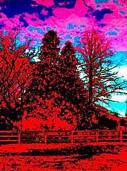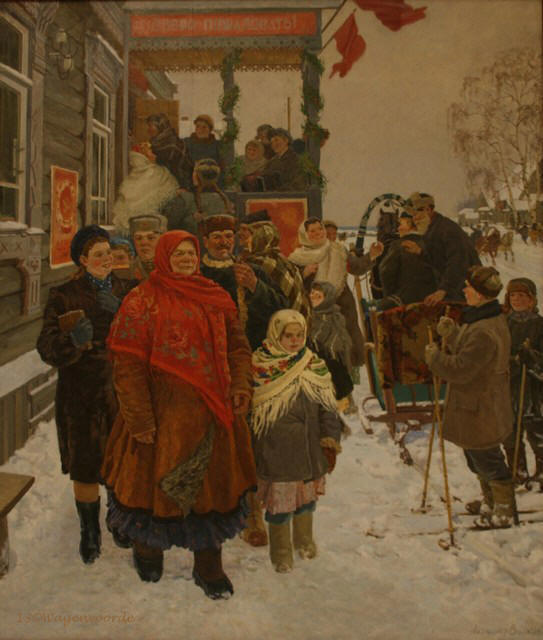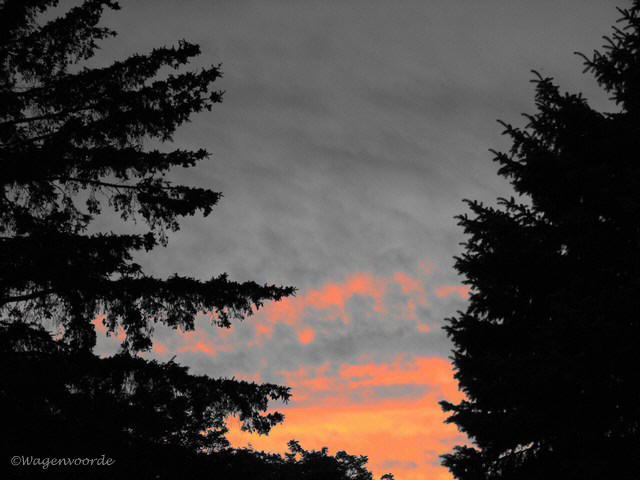
Cedar Gallery
Home
|
Cedar info |
News |
Contact |
![]() Dutch
Dutch

Verkiezingsdag voor de Opperste Sovjet van de USSR, 1949
A.V. Volokov

Western readers are well acquainted with poetry
written in Russia over the last three centuries, from Alexander Pushkin
to Anna Akhmatova, mostly through translations.
Some other Russian poets, including Vladimir Nabokov and Joseph Brodsky,
felt at home writing in English.
We hope to be able to offer you some poems of those famous poets. We
also hope to give you an opportunity to hear some newer voices.
The Golden Age of Russian poetry
The period from 1820 to about 1835 is known as the
‘Golden Age’ of Russian poetry. During this time poetry dominated
literary art, and a large number of very good poets were offering their
works to the public. Some examples of these interesting poets are: Zhukovsky,
Baratynsky, Batiushkov, Davydov, Vyazemsky, and Delvig. The works of
these writers provided the period with poetic depth and breadth;
however, each of them knew and acknowledged the genius of the greatest
poet of the period, Aleksandr Pushkin. Still today, Pushkin is as
revered by Russians as Shakespeare is by speakers of English.
Mikhail Lermontov and Fyodor Tyutchev are generally regarded as two most
important Romantic poets after Pushkin.Vasily Zhukovsky and Konstantin
Batyushkov are the best regarded of his precursors. Pushkin himself,
however, considered Evgeny Baratynsky to be the finest poet of his day.
The Silver Age of Russian poetry
Silver Age is a term traditionally applied by Russian
philologists to the first two decades of the 20th century. It was an
exceptionally creative period in the history of Russian poetry, on par
with the Golden Age a century earlier. The term Silver Age was first
suggested by philosopher Nikolai Berdyaev, but it only became customary
to refer thus to this era in literature in the 1960s. In the Western
world other terms, including Fin de siècle and Belle Époque, are
somewhat more popular.
Although the Silver Age may be said to have truly begun with the
appearance of Alexander Blok's ‘Verses to the Beautiful Lady’, some
scholars have extended its chronological framework to include the works
of the 1890s, starting with Nikolai Minsky's manifesto ‘With the light
of conscience’ (1890), Dmitri Merezhkovsky's treatise ‘About the reasons
for the decline of contemporary Russian literature’ (1893) and Valery
Bryusov's almanac ‘Russian symbolists’ (1894).
Alexander Blok emerged as the leading poet, respected by virtually
everyone. The poetic careers of Anna Akhmatova, Boris Pasternak, and
Osip Mandelstam, all of them spanning many decades, were also launched
during that period.
The Silver Age ended after the Russian Civil War. Blok's death and
Nikolai Gumilev's execution in 1921, as well as the appearance of the
highly influential Pasternak collection, My Sister is Life
(1922), marked the end of the era.
Contemporary poets
Gennady Aigi , Ivan Akhmetiev , Gennady Alexeyev,
Vladimir Aristov, Vladimir Earle, Dmitri Grigoriev, Elena Katsuba,
Konstantin Kedrov, Igor Kholin, Arvo Mets, Vsevolod Nekrasov , Rea
Nikonova , Genrikh Sapgir , Victor Krivulin, Asya Shneiderman , Sergey
Biryukov, Anatoly Kudryavitsky, Sergey Stratanovsky a.o.
For more names and further information, click here:
http://russianpoetsdatabase.blogspot.nl/
A little bird
In alien lands devoutly clinging
To age-old rites of Russian earth,
I let a captive bird go winging
To greet the radiant spring's rebirth.
My heart grew lighter then: why mutter
Against God's providence, and rage,
When I was free to set aflutter
But one poor captive from his cage!
1823
Alexandr Pushkin (1799-1837)

Night
My voice, to which love lends a tenderness and
yearning,
Disturbs night's dreamy calm... Pale at my bedside burning,
A taper wastes away... From out my heart there surge
Swift verses, streams of love, that hum and sing and merge
And, full of you, rush on, with passion overflowing.
I seem to see your eyes that, in the darkness glowing,
Meet mine... I see your smile... You speak to me alone:
My friend, my dearest friend... I love... I'm yours... your own.
Translated by I.Zheleznova
1823
Alexandr Pushkin (1799-1837)
To the Sea
Farewell, free element, o Sea!
For one last time I watch your tide
Like farewell mutter of a friend
Deserted for a colder clime,
The sad, inviting call you send
Resounds to me for one last time.
Beloved region of my soul!
How often, next to your shoreline,
Mute and beclouded I would stroll,
Borne with my ultimate design!
How much I loved your deep replies,
Your chasm's voice, your splashes' chime,
And silence at the evening time,
And gusts of fanciful surprise!
Tradesmen or fishers' humble boat
Glides bravely, guarded by your will,
Amid the waves, for days afloat;
But you turn rough, impregnable --
And schools of ships go down your throat.
I never got to say goodnight
To this unmoving, boring shore,
Greet you with surges of delight
And level my poetic flight
Along your crests forevermore.
You called, you waited... but the chain
And mighty passion held me bound;
My soul went out to you in vain;
Still, I remained upon the ground.
What to regret? Where, in distress,
Would I now set my path and goal?
One object in your wilderness
Could still affect my frigid soul.
One lofty crag, a glorious tomb...
There stately memories dwelled on
And plunged in sleep of cold and gloom:
There faded great Napoleon.
Amid great pangs he rested there.
And like a thunder afterwards,
Another genius left us bare,
Another master of our hearts.
He fled, bewailed by liberty,
Bequeathing to the world his palms.
Grow agitated, roar, o sea:
Of you, of you he sang his psalms.
Your image was designed on him,
In spirit he was made the same:
Like you, dynamic, deep and grim.
Like you, impossible to tame.
The world grew empty... Ocean, where,
What shore now would you cast me at?
Same all around the earthly share:
Where falls a drop of welfare, there
Guards preaching or an autocrat.
Farewell then, Sea! I won't forget
Your beauty full of solemn power;
Long, long will I be hearing yet
Your rumble at an evening hour.
To silent wilderness, to groves
I'll carry over, filled with you,
Your crags and waves, your bays and coves,
And shine, and shade, and murmuring blue.
Translated by Genia Gurarie
1824
Alexandr Pushkin (1799-1837)
The Cliff
By a cliff a golden cloud once lingered;
On his breast it slept, but, rising early,
Off it gently rushed across the pearly
Blue of sky, a tiny thing and winged.
Still, a trace it left upon the stony
Giant's heart, and plunged in thought and weeping
Slow and tortured tears, he stands there, keeping
Vigil o'er the gloomy waste and lonely.
* * *
I come out to the path, alone,
Night and wildness are referred to God,
Through the mist, the road gleams with stone,
Stars are speaking in the shinning lot.
There is grave and wonderful in heaven;
Earth is sleeping in a pale-blue light...
Why is then my heart such pined and heavy?
Is it waiting or regretting plight?
I expect that nothing more goes,
And for past I do not have regret,
I wish only freedom and repose,
I would fall asleep and all forget...
I would like to fall asleep forever,
But without cold sleep of death:
Let my breast be full of dozing fervor
For the life, and heave in gentle breath;
So that enchanting voice would ready
Day and night to sing to me of love,
And the oak, evergreen and shady,
Would decline to me and rustle above.
Translated by Yevgeny Bonver
Mihail Lermontov (1814-1841)
Unsuited to my purpose in the rhyming
Of martial odes or charming elegies.
In verses everything should be untimely,
No punctualities.
I wish you were aware from what stray matter
Springs poetry to prosper without shame,
Like dandelions which the children scatter,
Or pigweed of the lowly name.
An angry shout, the molten tar's hot stinging,
A magic growth of mould upon a wall...
And straightaway the verse is gaily ringing
To gladden one and all.
Anna Akhmatova (1889-1966)
More information:
Handbook of Russian Literature – Dr. Victor Terras
An Introduction to Russian Language and Literature – R. Auty and D.
Obolensky
Texts, pictures,
etc. are the property of their respective owners.
Cedar Gallery is a non-profit site. All works and articles are published
on this site purely for educational reasons, for the purpose of
information and with good intentions. If the legal representatives ask
us to remove a text or picture from the site, this will be done
immediately. We guarantee to fulfill such demands within 72 hours.
(Cedar Gallery reserves the right to investigate whether the person
submitting that demand is authorized to do so or not).
The contents of this website (texts, pictures and other material) are protected by copyright. You are welcome to visit the site and enjoy it, but you are not allowed to use it, copy it, spread it. If you like to use a picture or text, first send your request to